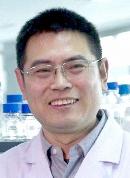
After the death of Zhao Zhendong-a prominent immunologist at the Chinese Academy of Medical Sciences-what kept popping up in his wife's mind was him sitting on the living room sofa engaged in various tasks, such as writing bid documents, revising papers and downloading research journals on his laptop.
"Zhendong was born for scientific research, and his passion for the research amounted to obsession," said his wife, Wang Bin. "He had always been living in his own world, which is the research realm of infection and immunity, and his life almost included no other content."
Zhao, 53, who led a technical support team for the research and development of COVID-19 vaccines under the State Council, China's Cabinet, died from a heart attack on Sept 17 at Beijing Capital International Airport.
He had always been living in his own world, which is the research realm of infection and immunity, and his life almost included no other content.
Wang Bin, wife of prominent immunologist Zhao Zhendong
He had been on a tour to Wuhan, Hubei province, to inspect a workshop for manufacturing COVID-19 vaccines, and had then traveled to Changsha, Hunan province, to participate in an academic conference before returning to Beijing, the academy said.
ALSO READ: No serious side effects reported as 60,000 test China's vaccines
Before his death, Zhao had worked for more than half a year under a tight schedule and heavy workload with other researchers to accelerate the research and development of COVID-19 vaccines, according to his colleagues at the academy.
"He had been working on the front line since the outbreak of the epidemic, … provided suggestions and technical support for the research and development of COVID-19 vaccines-including participating in drafting a general standard for biosecurity for vaccine production-and made great contributions to COVID-19 vaccine research and development," said Wang Yunfeng, deputy Party chief of the CAMS.
"Zhao had been adhering to principles, truth and rigorous academic pursuit. He was also a man of integrity and enjoyed a good reputation among his colleagues, relatives and friends," he said.
Zhao earned a doctorate in medicine in 1998 and did postdoctoral study between 1998 and 2002 at the Cleveland Clinic Foundation in the United States, according to the CAMS. He got a job at Peking University in 2003 and then began working for the CAMS in 2008.
Wang Bei, a virus researcher at the CAMS who studied under Zhao, said that Zhao devoted almost all his time to scientific research and was very serious about his students' academic pursuits.
"What impressed me most was his perseverance in academic research and pursuit for perfection," she said. "He told us we must keep exploring to get to the root in any scientific research, and do the best possible."
"Affected by Zhao's tutorship, I have learned to never give up easily in my research, however difficult it may be," Wang said.
Wang Bin, Zhao's wife, who is also an official in charge of disease control and prevention at the National Health Commission, said Zhao's perseverance in science led him to work tirelessly even before the outbreak of the COVID-19 epidemic.
He often woke up at 5 am and would immediately start to search for and read various academic journals online, she said. The commute from their home to work, which lasted four hours every day, was also a time for study and research for Zhao.
"Others may be impressed by his extensive knowledge in his field of research, but I am aware it was the result of accumulation year after year," she said.
Wang Chen, president of the CAMS, said in addition to his dedication to seeking truth, Zhao was also a man that always spoke the truth, even at the risk of offending others.
"He was a frank scholar, almost to the degree of bluntness," he said. "He would tell his real thoughts and stood for truth even when faced with objection. It is a precious trait for scholars, which is why he deserves respect."
READ MORE: China expands its arsenal in COVID-19 battle
Contact the writer at wangxiaodong@chinadaily.com.cn


